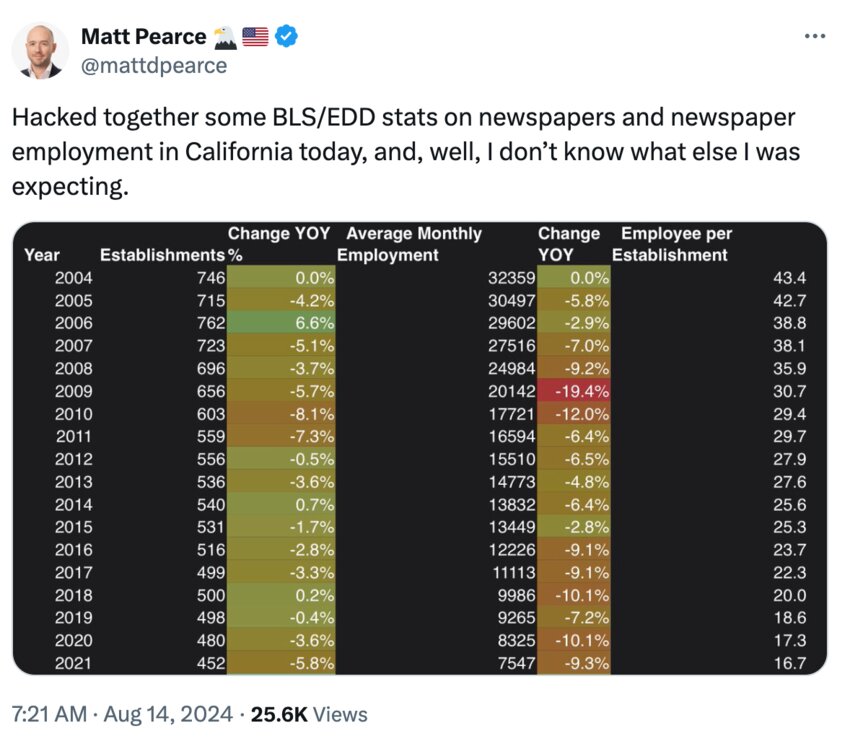Editor’s note: We were in the process of layout of this feature for the September 2024 issue of E&P when the public-private partnership was announced. This story is updated with that information, as well as including the back-story about the California legislation.
In a last-minute, closed-door deal that surprised many, Google secured an agreement late Wednesday with California lawmakers to circumvent two legislative bills that would have required it and other tech companies to compensate local newsrooms in the state for using their content.

Instead, late on Wednesday, Assemblywoman Buffy Wicks, sponsor of one of the bills the deal bypassed, negotiated the agreement with Google, which California Governor Gavin Newsome prompted. Wicks’ office released a statement announcing the public-private partnership would amount to $250 million over five years to support local newsrooms and, to the surprise of many who had been tracking these efforts, the creation of an AI Accelerator program.
Wicks’ bill AB886 California Journalism Preservation Act (CJPA), along with SB 1327 from Senator Steven Glazer, were a pair of bills that in recent months had been making strides in California’s legislature and had drawn a lot of attention from advocates and opponents like Google and Meta. The deal, called a private-public partnership by the proponents, comes ahead of an August 31st legislative deadline to get a bill to the governor’s desk for signature.
The full details of the new deal remain vague. However, CalMatters, a nonprofit newsroom that endorsed the deal in the announcement, reported: “The tech giant has agreed to pay $172 million to support local media outlets and start an artificial intelligence program.” The remainder of the funding for the efforts in the deal would come from California taxpayers or possibly from as-yet unsecured contributions from other tech companies like OpenAI.
This unprecedented agreement in the U.S. replaces two legislative efforts aimed at requiring tech companies like Google to pay news organizations directly for using their content. Those close to negotiations told E&P the deal was seen as a way to forestall threats by Google and Meta, the parent company of Facebook and Instagram, to block California newsrooms from their platforms and end already existing support programs they offer to local newsrooms as retaliation for legislative mandates or taxes.

Rebuild Local News, an organization founded by Steve Waldman to champion finding new ways to lend financial support to local news nationwide, said in a statement, “The deal [will] apparently provide $45 million ($15 million from Google; $30 million from the government) in new funding in the first year for local newsrooms, and some support still to be determined in out years.”
The organization called the deal a “step forward.” However, from the available information, the agreement falls short of what Rebuild Local News believes is needed to fully aid struggling local newsrooms in the state. They pointed out the deal was far less than Google’s $60-65 million one-year agreement to support Canadian newsrooms. The statement calculated California local newsrooms could receive somewhere between $7000 and $10,000 per editorial employee if the deal aligns with what had been drafted in the sidelined legislative bills.
The agreement has sparked significant criticism, particularly from those excluded from the negotiations. California Senator Steven Glazer, whose bill SB 1327 would have imposed a tax on major tech companies to provide broader and potentially more substantial support to California news organizations, was notably left out of the talks despite being a co-sponsor of Wicks’ bill. Glazer’s SB1327, which also aimed to address the impact of tech platforms’ advertising practices on newsrooms, would have required a two-thirds majority to pass the legislature and was seen as a more direct challenge to tech giants like Google and Meta.
Glazer told reporters the deal “seriously undercuts our work toward a long-term solution to rescue independent journalism.” His office issued a statement on their website late Wednesday: “Despite the good intentions of the parties involved, this proposal does not provide sufficient resources to bring independent news gathering in California out of its death spiral.”
The agreement’s inclusion of funds for an AI accelerator program raised concerns among labor advocates about potential job losses in the media industry.
The Media Guild of the West, representing unions such as the Los Angeles Times Guild, Southern California News Group and the Long Beach Media Guild, also strongly criticized the deal. In a statement released Wednesday, the Guild described the agreement as “undemocratic and secretive,” emphasizing that “not a single organization representing journalists” was involved in the deal. The Guild expressed deep frustration: “After two years of advocacy for strong antimonopoly action to start turning around the decline of local newsrooms, we are left almost without words.”

Danielle Coffey, president and CEO of the News/Media Alliance, a trade group representing news publishers, echoed these concerns, criticizing Google as a “dominant monopoly” that profits from repackaging news content without adequately compensating publishers. Coffey emphasized the need for federal legislation, such as the Journalism Competition & Preservation Act (JCPA), to address the marketplace imbalances and ensure fair compensation for news organizations.
The recent antitrust ruling by the Department of Justice against Google, which found the company had violated laws through its search and advertising practices, further underscores the urgency of addressing the power imbalance between tech giants and news organizations. Coffey noted that this ruling highlights the need for continued efforts to hold companies like Google accountable and restore competition to the marketplace.
Julie Makinen, a board chairperson of the California News Publishers Association, acknowledged the deal as a step in the right direction but admitted it fell short of the initial goals. “This is a first step toward what we hope will become a comprehensive program to sustain local news in the long term,” she said.
As the legislative session nears its end, the future of local journalism in California remains uncertain, with ongoing debates over whether this agreement will provide the necessary support or if further action is needed to protect the industry from the growing influence of tech platforms.
Taking on Big Tech

California has been losing newsrooms and journalism jobs like many other states. The News Guild’s Media Guild West chapter and several other unions and trade associations support the bills. Recently, the Guild chapter president, Matt Pearce, shared a post on X (formerly known as Twitter) showing the shrinking of California’s newspaper industry. The data set he cited indicated a loss of some 300 newspapers and more than 24,000 journalism jobs across the state from 2004 to 2021.
Pearce, Waldman and other supporters say the financial support is critical for the state's struggling newsrooms.
This turn toward seeking government support for local news has happened in several states for a while. New York recently passed legislation that would give newsroom tax credits. But what surprised many in California was that legislators targeted Big Tech directly, one of the state’s most prized and powerful industries, to pay for the effort.
Both California bills targeted the most prominent tech platforms — Google, Meta and possibly others — based on how they share and link to newsroom content and earn revenue from the content. This resulted in both Google and Meta threatening to stop linking to or sharing California news sites, leading into the June votes that pushed the legislation forward.
Google and Meta have used this tactic in other jurisdictions to fight against similar legislative efforts, including in Australia and Canada. The results showed that each of those countries still saw laws passed requiring the platforms to contribute funds to news publishers, but this resulted in concessions by lawmakers to mollify the tech powerhouses.
In May 2023, before June, when both Wicks’ AB886 and Glazer's 1327 passed major votes to move forward, a Meta spokesperson said if CJPA became law, it would pull news from both Facebook and Instagram.
In a blog post in April, Google's VP of global news partnerships, Jaffer Zaidi, announced that the platform would begin running a test run to block California news sites related to CJPA. He said other support for California news outlets was also on the chopping block: “Until there's clarity on California’s regulatory environment, we’re also pausing further investments in the California news ecosystem, including new partnerships through Google News Showcase, our product and licensing program for news organizations, and planned expansions of the Google News Initiative.”
The threat to restrict news sites in the state scared many, as did the idea of ending the Google News Initiative (GNI). GNI has provided grants and supportive services to local newsrooms worldwide since 2019, amounting to what it says is $300 million in support.
Within days of Zaidi’s blog post, the California News Publishers Association issued a letter from 350 state news organizations (supported by those in other states), saying CJPA was a needed lifeline for local news organizations. Its authors noted that specifically targeting Google was justified by the cataclysmic shift over two decades of advertising revenue leaving news publishers for the tech platform: “In 2005, newspapers earned more than $45 billion in advertising revenue, while Google had $6 billion in advertising revenue. By 2020, this had completely flipped, with the entire U.S. newspaper industry earning just $9.6 billion from advertising, while Google’s ad revenue had grown to $147 billion. No industry can survive when one company controls 80% of the revenue.”
At the time the News/Media Alliance joined CNPA in calling on state authorities, the Federal Trade Commission and the U.S. Department of Justice to investigate Google’s threats to shut down news in California: “Google is violating federal law in blocking or impeding their (Californians) ability to find news that they rely upon for their business, their prosperity, their pleasure, their democracy and, sometimes, their lives.”
CNPA lent its support to the new deal, while the News/Media Alliance called for federal legislation to address what it sees as a power imbalance in favor of Big Tech.
The backdrop to this is several high-profile federal antitrust lawsuits against Google that have been going through the courts, examining whether the tech giant is a monopoly and if its advertising products constitute unfair practice. In early August, a federal judge ruled that Google’s app store violated antitrust laws and created a monopoly.
In June, before the votes on SB1327 & AB886, another federal judge ruled on a separate antitrust lawsuit to determine if Google’s advertising practices violate federal law could move forward. That lawsuit is supported by several State Attorneys General, including California’s, and is slated to begin on September 9. Both were seen as significant losses for the tech giant.
A spokesperson from Glazer's office told E&P in mid-August, just before the current deal was being negotiated, that those setbacks hadn’t changed the stance of the tech firms regarding the California bills. “Tech platforms haven’t been in a negotiating frame,” Steven Harmon, policy analyst and communications director for Senator Glazer, wrote in an email to E&P. “They're more in an opposition campaign mode, including the threats to block links and cancel GNI; also attack ads are blanketing airwaves and online.”
Sources close to the negotiation told E&P the current deal is an effort to abate those threats.
The devil is in the details
One of the biggest concerns throughout the negotiations on the bills and now with the current private-public deal has been whether there will be enough or any money for the many smaller, independent local news organizations that serve community needs. Advocacy on that topic resulted in changes to the bills to support smaller organizations, including allowing funding for smaller organizations to be compensated to pay freelancers. According to those familiar with it, that concession isn’t included in the current deal.

LION Publishers, a trade association supporting small independent news publishers with 575 newsroom members — including 74 in California- endorsed the new deal, issuing a statement included in Wicks’ announcement. Chris Krewson, LION's executive director, said, “The work of local independent publishers is essential to a well-functioning democracy, and this new public-private partnership provides immediate and needed relief. Lawmakers should be proud of this program, which builds on California's innovative Local News Fellowship with millions of new dollars in a way that prioritizes small publishers and those serving underrepresented groups.”
Krewson acknowledged to E&P in mid-August that, based on what we knew about the limitations imposed by the legislative bills, some of its smaller members may not qualify for support. He said, “Twenty-four (California members) earn less than $50k per year, and many of those are under a year old, so also would not qualify for that reason.” It remains unclear if the current deal would make room for these types of news outlets.

Who would be able to access support and how that would be decided were the concerns for Dana Amihere, the founder and executive director of the award-winning nonprofit newsroom AfroLA, when E&P spoke with her days before the deal was announced to get her opinion on the legislative efforts. At the time, she said she was pessimistic about the positive impact on small newsrooms if the bills were to pass.
Amihere said what bothered her about the process of formulating the legislation was that large corporate newsrooms and those owned by hedge funds, along with national organizations with powerful lobbying efforts, have been the ones to influence the process. However, smaller independent newsrooms, like AfroLA, that are struggling and are entrenched in their communities weren't consulted in any real way about what's needed. “It’s not about us or what will actually create a stronger news ecosystem. Hearing ‘We’re saving local news’ makes me wonder if anyone is asking how to build something better than what we've had. I'm not convinced of that.”
Krewson told E&P that LION met with its members about the legislation a few weeks ago to keep them in the loop, and he said some of his members were asked and did lend their support to the current deal. What Krewson said he’s heard from his members is they wanted more help in getting their voices heard in these processes, “We heard clearly from them that LION as an org[anization] could best support them by more actively proposing solutions that would help them first, which is part of the reason we’re working toward a full-time role at LION in that regard.”
 Diane Sylvester is an award-winning 30-year multimedia news veteran. She works as a reporter, editor, and newsroom strategist. She can be reached at diane.povcreative@gmail.com.
Diane Sylvester is an award-winning 30-year multimedia news veteran. She works as a reporter, editor, and newsroom strategist. She can be reached at diane.povcreative@gmail.com.
Comments
No comments on this item Please log in to comment by clicking here